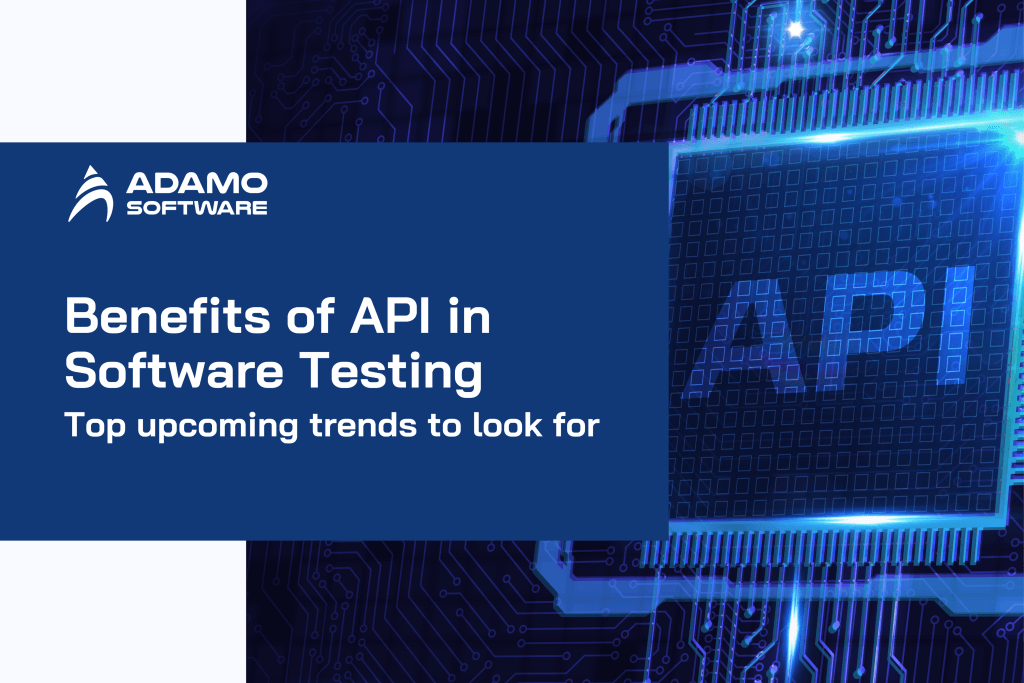Best AI in Software Development Use Cases for 2026
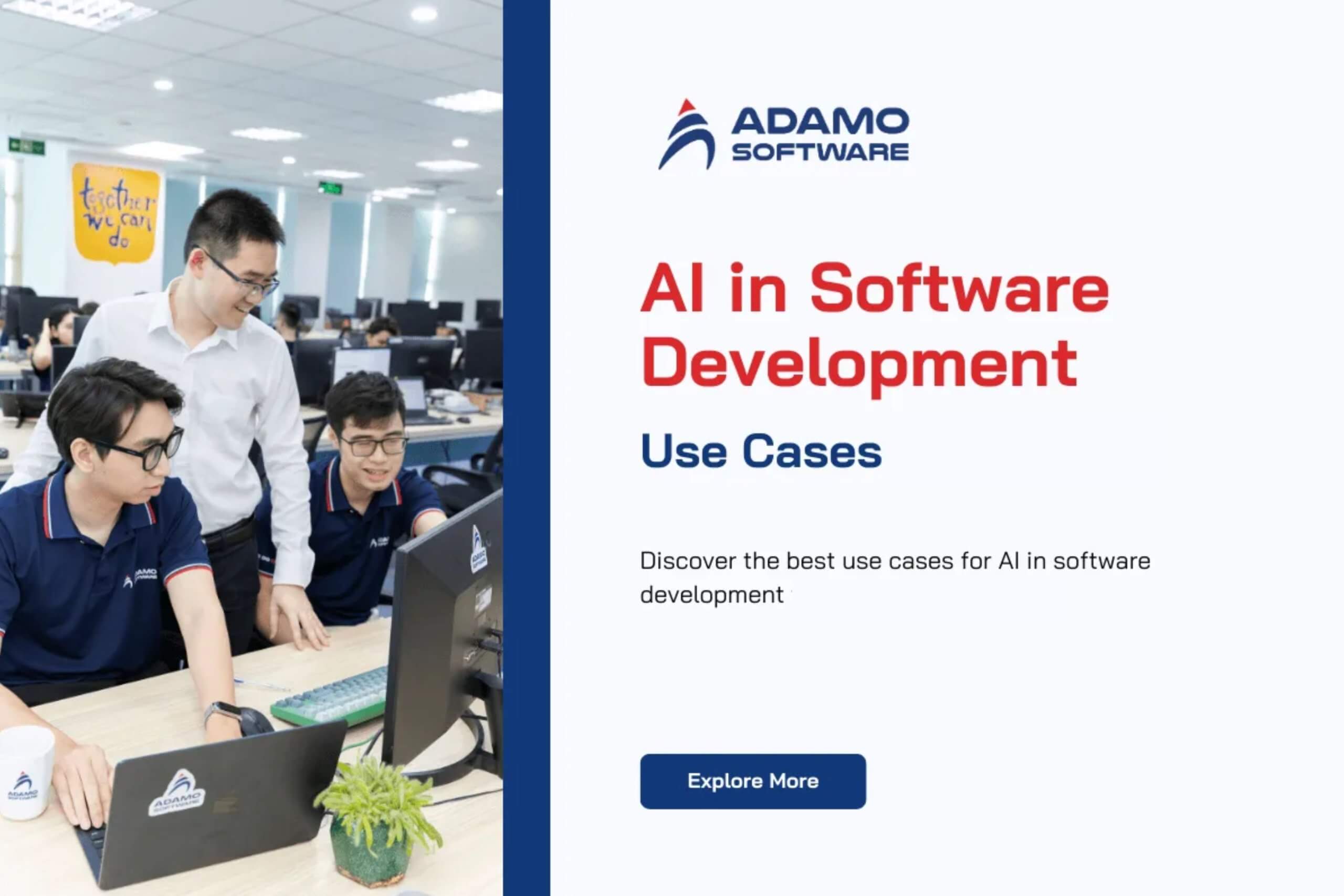
Software engineering is going through some significant changes with the application of AI in software development. No longer some far-fetched ideas in sci-fi movies, AI is now a powerful tool that optimizes software production processes, improves efficiency, and creates a revolution across industries.
This article will investigate the various ways AI is impacting the software development landscape, with specific use cases of AI in software development across different sectors.
I. AI is Transforming Software Development
There have been tremendous shifts in the software development industry thanks to AI. Data from Grand View Research indicates that software solutions are at the top spot in the AI market, making up 35.8% of its global revenue in 2025. These uses of AI in software development are optimizing every step of the software engineer process, all the way from the first-stage analysis and planning to coding, testing, and sometimes even maintenance.
AI can analyze huge sets of data to find out users’ needs and preferences, providing information for project plans and even automating some code processes. This gives developers much more time and energy to focus on more critical tasks that specifically require human creativity and problem-solving skills.
Another benefit of AI in software development is in testing and quality assurance. AI-powered testing tools can generate sample cases, run tests on those under different situations, and come up with real-time analysis results. This allows software to be thoroughly tested and enhances the test outcomes.
Thanks to AI’s ability to process large datasets, developers can now get more valuable insights and make informed decisions based on data throughout the whole development process.
II. 7 Types of AI in Software Development
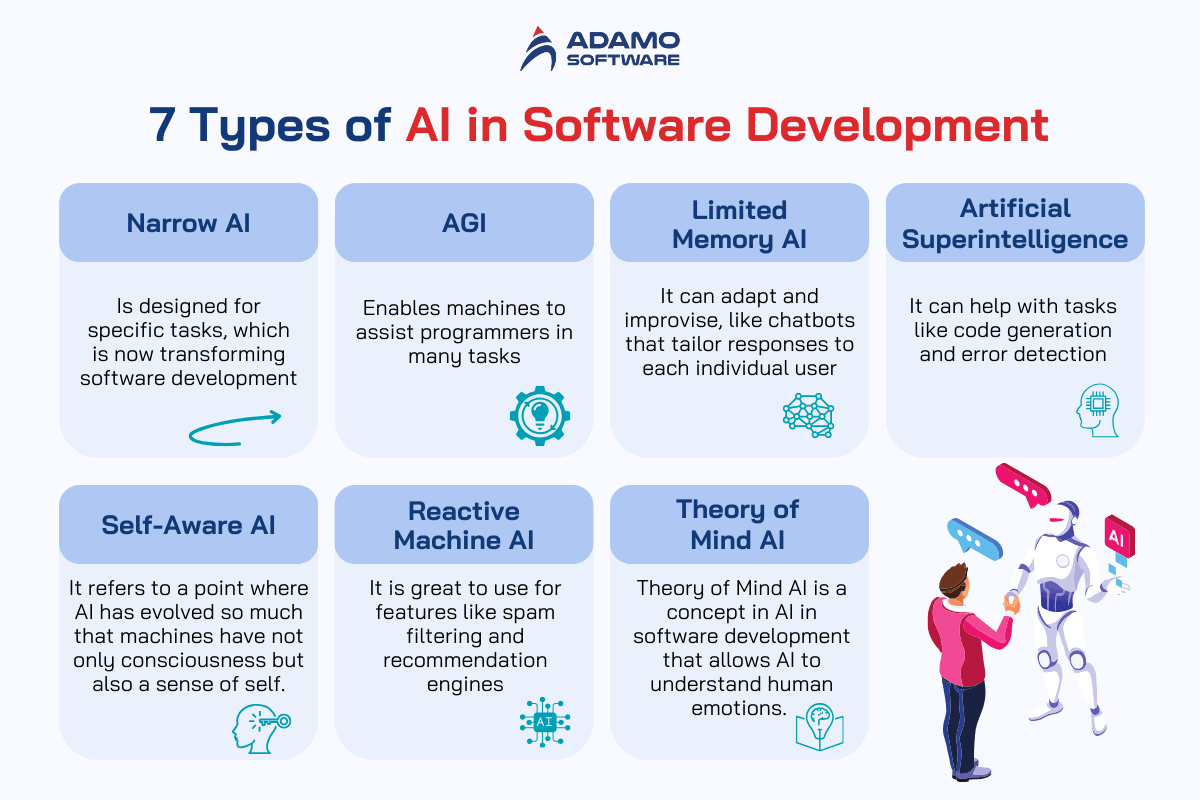
– Narrow AI: Narrow AI is the type of artificial intelligence (AI) that is designed for specific tasks, which is now transforming software development. Tools like machine learning can automate repetitive tasks and enhance software quality significantly. However, their shortcoming is that they cannot develop new skills and just outperform in one area. Examples are cases of image recognition software or AI assistants that only excel in their specific functions.
– Artificial General Intelligence (AGI): Artificial general intelligence (AGI) research is a very important application of AI in software development, which enables machines to assist programmers in many tasks. This technology, also known as strong AI, is pretty much the steppingstone of machines with human-like learning and problem-solving abilities.
– Limited Memory AI: Limited memory AI is a key technology in many AI in software development applications. It learns by storing and using past data. This “short-term memory” allows its ability to adapt and improvise, like chatbots that tailor responses to each individual user.
– Artificial Superintelligence: In sci-fi movies, artificial superintelligence (ASI) can come off as some threat that’s going to take over humanity. But this type of AI in software development can be a powerful tool for human programmers. It can help with tasks like code generation and error detection, making the development process much faster and more efficient.
– Self-Aware AI: The ultimate goal in AI development is something that goes far beyond its current capabilities – Self-Aware AI. This theoretical “singularity” refers to a point where AI in software development has evolved so much that machines have not only consciousness but also a sense of self. However, this raises ethical concerns that such powerful AI could be out of human control.
– Reactive Machine AI: Reactive machine AI is the most basic type of AI in software development. It has outstanding abilities for immediate tasks but lacks memory and learning capabilities. It is great to use for features like spam filtering and recommendation engines, which mainly rely on user inputs but are unable to build on those inputs for more complex tasks.
– Theory of Mind AI: Theory of Mind AI is a concept in AI in software development that allows AI to understand human emotions. For instance, it could improve self-driving cars by enabling them to comprehend a driver’s caution based on emotional cues from the environment – something current AI is still not capable of doing.
Also read: Ai in Manufacturing: Definition, Benefits, Use Cases, Challenges
III. AI and Software Development Use Cases Across Industries
1. Healthcare
The healthcare industry is being revolutionized thanks to AI in software development, through the creation of intelligent applications that improve patient care, streamline workflows, and accelerate medical breakthroughs. Some use cases examples of AI in software development for this sector include:
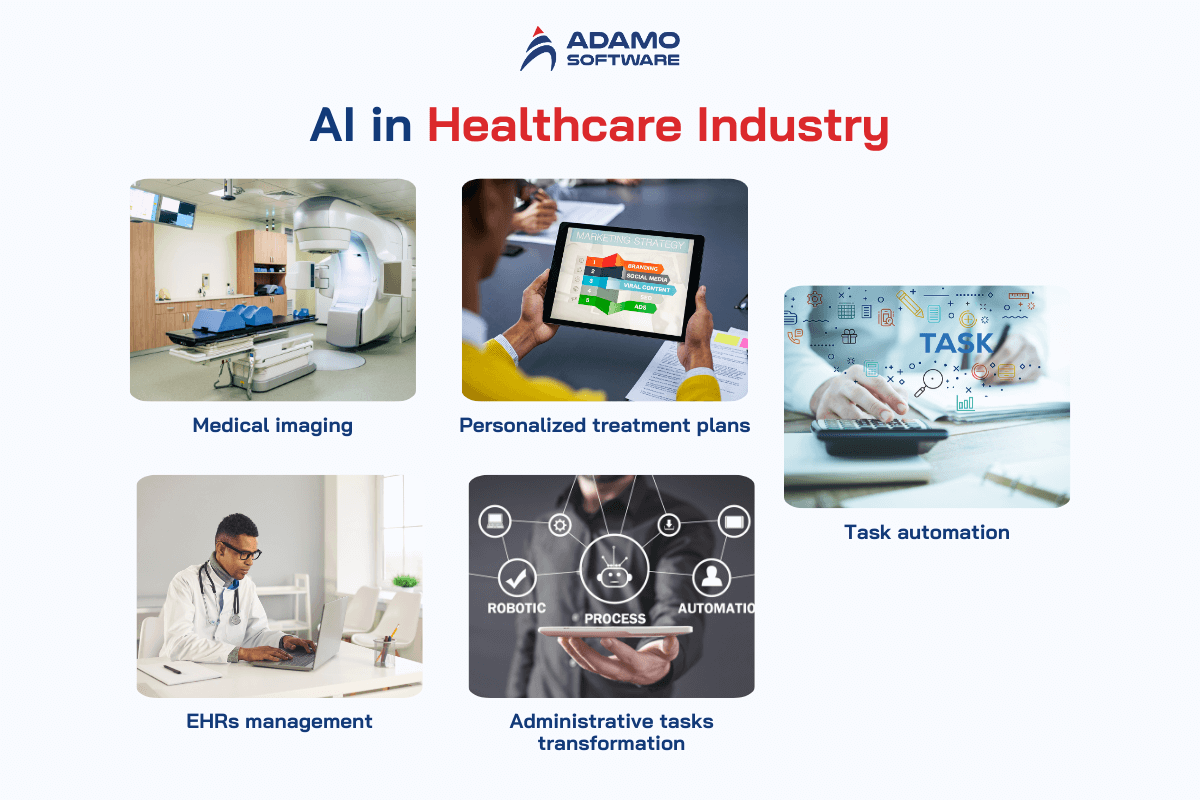
– Medical imaging: AI can analyze X-rays and CT scans with high accuracy, allowing early detection of diseases and reducing the risk of false diagnoses.
– Personalized treatment plans: AI tools can help analyze patients’ data including information about genetics and lifestyle factors, to predict disease risks and suggest tailored treatment plans.
– EHRs management: AI helps manage Electronic Health Records (EHRs) by finding patterns and trends that can point out possible risks, and therefore, coming up with strategies to prevent them.
– Administrative tasks transformation: AI-powered virtual assistants and chatbots can assist with answering patient inquiries, scheduling appointments, and delivering health information, giving healthcare professionals more time for other important tasks.
– Task automation: AI can automate tasks like medical documentation and record management while ensuring high accuracy and efficiency. This allows medical professionals to focus on patient care and other critical issues.
2. Travel and Hospitality
The application of AI in software development is also making big changes in the travel and hospitality industry, bringing a more personalized and efficient experience to both travelers and businesses.
For travelers, AI tools offer a range of benefits:
– Personalized travel planning: Customized itineraries based on preferences, budget, and past travel history, and even suggestions on special places – all made possible with the help of these AI tools.
– Smart travel companions: AI tools can provide real-time support and recommendations throughout the whole journey. It can assist with the booking process, language translation, avoiding any difficulties with navigation and communication.
– Dynamic pricing and shopping: AI can optimize pricing following demand and suggests the best deals on hotels and travel activities. This helps travelers to easily compare different options and choose the one that best fits their preference.
The hospitality industry is also positively affected by AI for software development:
– Enhanced guest experience: AI can enhance the experience by personalizing recommendations for accommodations, dining, and activities based on available data about guest preferences. Other applications like smart room automation can help tailor the environment to individual needs, while AI chatbots can provide 24/7 customer service.
– Revenue optimization: Hotels and resorts maximize room occupancy and revenue with the help of AI tools through analyzing market trends and historical data to develop dynamic pricing strategies.
– Improved guest sentiment analysis: AI tools can help analyze feedback and reviews, from then on find out areas for improvement. This allows hotels to timely address guest concerns and increase overall satisfaction.
3. eCommerce and Retail
The e-commerce and retail landscape are being transformed thanks to the implementation of AI in software development, with many use cases such as:
– Personalized Shopping: AI can help suggest products that fit just right with individual tastes based on past behavior and preferences.
– Improved Customer Support: AI-powered chatbots provide real-time support and address inquiries, which ultimately results in increased satisfaction.
– Optimized Inventory Management: AI tools can predict demand patterns to help sellers avoid stockouts and overstock situations.
– Targeted Marketing: AI tools can work on detailed segmentation to personalize product recommendations and marketing campaigns, helping companies to achieve higher conversion rates.
4. Fintech Solutions
The use of AI in software development is changing the fintech industry, creating many application cases that help enhance security and personalize financial services such as:
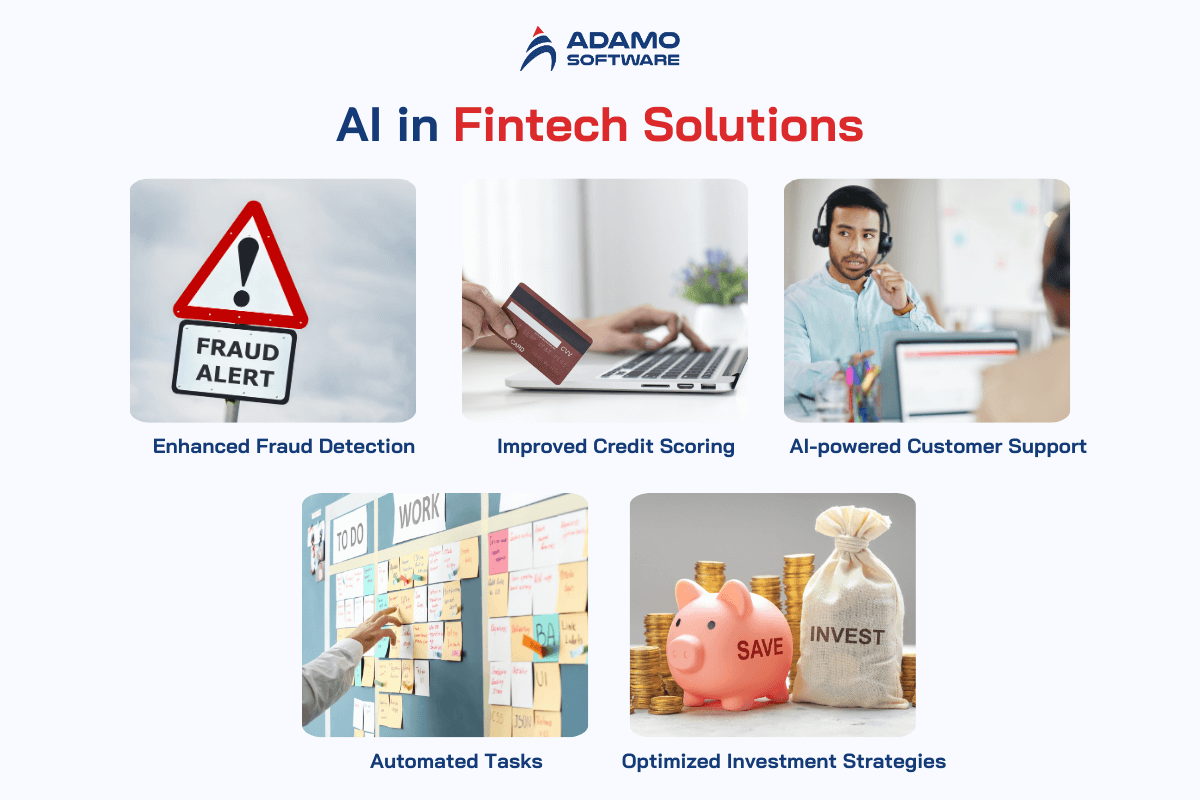
– Enhanced Fraud Detection: These AI tools can analyze transactions to identify any suspicious activities and protect customers’ accounts and data.
– Improved Credit Scoring: AI tools use various data sources to better assess risk and evaluate customers’ creditworthiness.
– AI-powered Customer Support: With AI chatbots, customers can receive instant support and personalized financial guidance to make better financial decisions.
– Automated Tasks: AI helps streamline document processing and data extraction, hence, increasing efficiency and compliance.
– Optimized Investment Strategies: Thanks to its capability to process large datasets, AI tools can help portfolio managers to analyze data and personalize investment strategies.
5. Supply Chain Management
The supply chain industry is another one that benefits from the application of AI in software development, with use cases vary as follows:
– Warehouse management: AI can optimize warehouse layout by analyzing product demand and inventory levels. This helps maximize space utilization, reduce fulfillment times, and increase storage capacity. AI tools also assist the automation of inventory management by accurately monitoring stock levels and automating replenishment protocols. This helps minimize errors and optimize workforce allocation, which leads to a more efficient warehouse operation.
– Delivery optimization: AI allows logistics companies to optimize deliveries with real-time traffic management and demand forecast, allowing them to monitor and adjust logistic plans accordingly and operate more effectively.
– Customer service enhancement: AI-powered chatbots can provide real-time updates on shipping status, answer inquiries, and address common customer concerns. This will help speed up the customer support process and improve satisfaction levels, especially during times when there is high demand. By utilizing AI in software development, the supply chain industry can gradually move towards a more data-driven and customer-centric future.
6. Social Media and Entertainment
AI in software development is also improving the social media and entertainment industry, crafting a more personalized and engaging experience for users. Some of the key areas of impact include:
– Content recommendation and discovery: AI can now help personalize suggestions on streaming services like Netflix and Spotify. Based on analysis of user data such as viewing and listening history, AI then recommends content that is best suited to each person’s preference. This not only improves user satisfaction but also keeps them engaged with the platform for longer durations.
– Content creation and automation: AI is playing a vital role in content creation across various media formats. AI tools assist writers with crafting more intriguing pieces by analyzing data and making smart suggestions for character development and plot structures. In terms of film production, AI can optimize the editing process by identifying the most important scenes. AI can sometimes even be used in music composing to generate music and lyrics.
– Social media and advertising: Social media platforms utilize AI to personalize user experiences on their content feeds, advertisements, and recommendations, all based on analysis of individual preferences and past behaviors. This enhances user engagement and satisfaction while ensuring a safer online environment. AI is also transforming advertising by analyzing large amounts of data to create and deliver targeted ads that resonate more with audiences.
– Gaming and storytelling: AI enhances the gaming experience by creating more realistic and challenging games. AI develops worthy opponents for players to play against and generates content like new levels and characters, ensuring a fresh and engaging gaming experience. For storytelling, AI can assist the development process of interesting narratives by analyzing data to offer insights into character development and plot structures.
7. Education Technology
The use of AI in software development is fundamentally reshaping the education sector. Some of the use cases in education where AI is making a significant impact are:
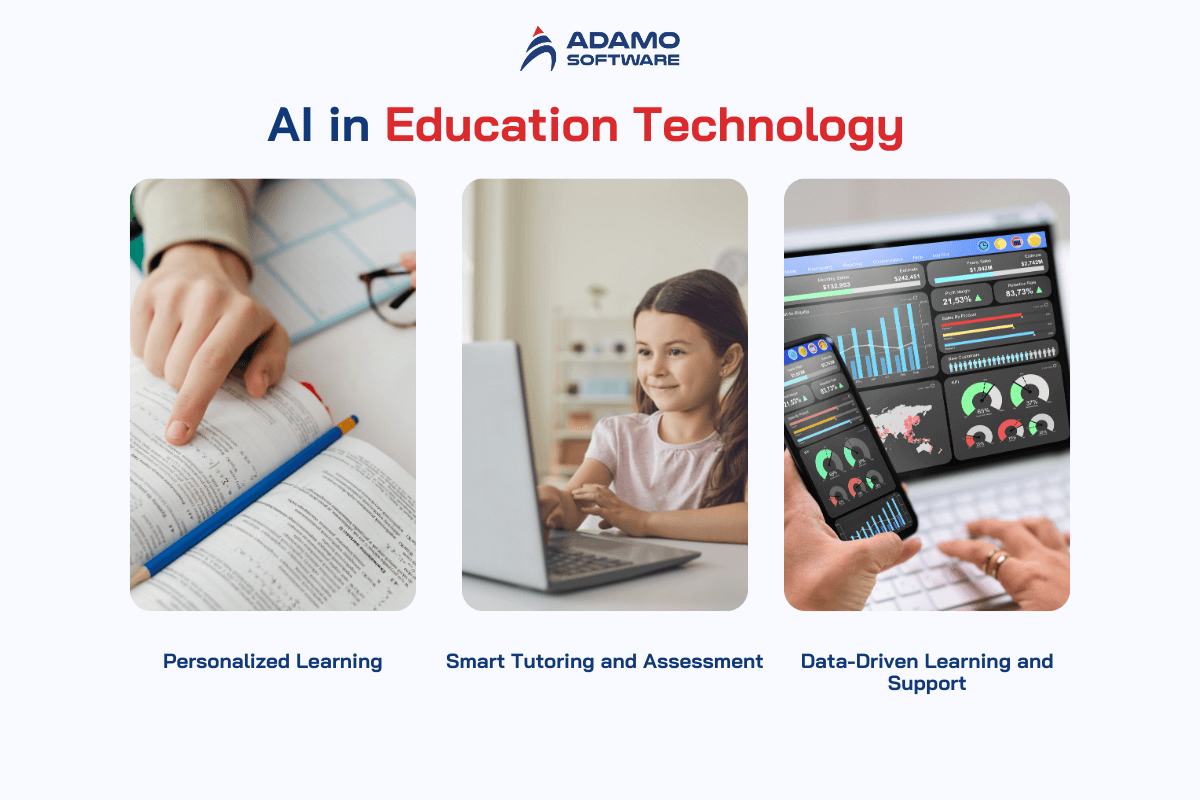
– Personalized Learning: AI personalizes the learning experience by providing educational content as each student needs. In this way, students are ensured to be challenged appropriately and progress at a pace that is comfortable for them. Additionally, by analyzing new data from students’ learning process, AI can identify knowledge gaps and recommend tailored study plans for each of them.
– Smart Tutoring and Assessment: AI-powered tutoring systems can provide students with personalized guidelines and feedback. These intelligent tutors adapt easily to individual learning styles, which allows them to offer targeted support and explanations in various subjects. AI can also automate the grading process for assessments, quizzes, and exams, giving educators more time to work on other individualized instruction.
– Data-Driven Learning and Support: AI can provide educators with valuable insights through learning analytics. These analytics dig deeply into student performance data, identifying their strengths, weaknesses, and learning patterns. Teachers can then use this data to find out areas where students might need additional support and assist them accordingly.
8. Automation
The last industry to receive great benefits from the application of AI in software development is the automation industry, with various use cases such as:
– Intelligent Traffic Management: AI is transforming traffic management through the analysis of real-time data from sources like GPS or surveillance cameras. This enables dynamic traffic signal control, suggesting alternative routes to drivers, and effectively identifying accidents. This will reduce congestion, improve road safety, and provide drivers with a more efficient and stress-free driving experience.
– Personalized Customer Service in Automotive: AI can personalize customers’ experience by providing them with services and recommendations based on their needs and preferences. By analyzing data such as past purchases and driving habits, AI tools can suggest relevant vehicle features and maintenance dates. And as usual, AI-powered chatbots can offer instant support, guiding customers through various processes.
– Predictive Maintenance and Manufacturing Optimization: AI is revolutionizing vehicle maintenance by analyzing huge chunks of data to identify potential issues and encourage proactive maintenance actions. This shift from preventive to predictive maintenance reduces downtime, increases efficiency, and extends vehicle lifespans. Furthermore, AI can optimize the manufacturing process with the help of IoT (Internet of Things) and predictive analytics. This reduces the risk of equipment failures and ultimately improves overall manufacturing efficiency.
IV. How Much Does It Cost to Develop AI for Software Development
The cost of incorporating AI in software development can vary from case to case, depending on the scale and complexity of your project. For instance, smaller scale projects with basic functions like chatbots can have only minimal cost. In contrast, bigger scale projects with more complex requirements for AI features like facial recognition, or medical diagnosis tools powered by AI, would certainly require a much larger investment.
All the factors that contribute to the scale of each project like the amount of data to be trained on the AI model, the human resources and expertise of each team member, as well as any cost that might incur before and after the development process will all influence the overall expenses.
Therefore, it is essential to really understand your project and carefully take into account all those factors to have a suitable budget before starting.
For easy reference, the cost of using AI in software development based on the project scale are as follows:
– Small scale projects: $10,000 – $100,000
– Medium scale projects: $100,000 – $500,000
– Large scale projects: $500,000 – $900,000
– Corporate-level projects: $900,000+
V. Why Chooses Adamo for Artificial Intelligence Software Development
If you are considering embarking on your journey of AI in software development, then Adamo Software has just what you need.

Our artificial intelligence software developer can help you integrate AI into your current IT infrastructure, automating tasks and minimizing human errors. We can help you boost customer engagement, increase revenue, and gain a significant competitive advantage against your rivals.
By using cutting-edge AI technologies, Adamo Software equips businesses with innovative software solutions that unlock valuable data insights and drive data-powered transformations. Our comprehensive AI development services encompass a wide range of industries, from travel and hospitality to healthcare, fintech, media, e-commerce, and education.
Ready to leverage AI for your business? Contact us today for your successful journey ahead!




